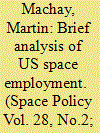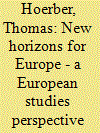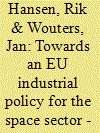|
|
|
Sort Order |
|
|
|
Items / Page
|
|
|
|
|
|
|
| Srl | Item |
| 1 |
ID:
113041


|
|
|
|
|
| Publication |
2012.
|
| Summary/Abstract |
Space policy is an area of industrial economic policy. The space economy would vanish without the active role of the state. Although space may appear exotic to economist, it is not impossible to provide a quick economic insight into one of the most important aspects of all economic activities - the people employed. The space industry can attract employees from other industries in two ways. First, according to individual preferences and motivations. Second, on the basis of higher wages. Statistical evidence suggests the latter is more common. Moreover wages do not reflect productivity. NASA employees earn much more than employees in law or medicine. This does not match the social importance of these activities. Space employs many more people that stated by the OECD. Taking all activities together space employs almost half a million people in the USA. $1 billion given to NASA creates up to 24 000 vacancies in the space industry and also provides room for another 40 000 in the space economy in the long run. Current changes to the US national space programme suggest a decrease of $1.6 billion per year, implying a loss of up to 39 000 jobs.
|
|
|
|
|
|
|
|
|
|
|
|
|
|
|
|
| 2 |
ID:
113038


|
|
|
|
|
| Publication |
2012.
|
| Summary/Abstract |
This paper analyses the growing involvement of the European Defence Agency (EA) in the field of space, suggesting that this is symptomatic of the greater importance now being placed on military space by the European Union. It charts the history of the agency in general and its role in space in particular, delineating the many synergetic relations it has with other space-related institutions at EU level. It argues that EDA is as much a response to socioeconomic as strategic considerations, and that it acts to protect European competitiveness in the arms field, thereby highlighting the rising significance of EU military space policy for European security and military institutions.
|
|
|
|
|
|
|
|
|
|
|
|
|
|
|
|
| 3 |
ID:
113040


|
|
|
|
|
| Publication |
2012.
|
| Summary/Abstract |
With its draft Code of Conduct for Outer Space Activities, the European Union has become visible in the debate on space security. In this paper we analyze this development, drawing on theoretical concepts in the scholarly debate about the 'actorness' of the EU. We find that the EU can be considered as an emerging actor in space security. However, the Code of Conduct initiative should be considered only a first step in this regard because it does not answer the question of whether the EU should pursue a policy of deterrence or arms control in space. We argue that the latter option would be better, because it is in line with the interests and values of the EU.
|
|
|
|
|
|
|
|
|
|
|
|
|
|
|
|
| 4 |
ID:
113032


|
|
|
|
|
| Publication |
2012.
|
| Summary/Abstract |
This introduction to a special issue sets out the themes to be explored - the role of the EU in a now largely peaceful Europe, the possibilities for space to become a more important tool of EU policy and its potential for promoting further European integration and a European identity - before discussing the various papers.
|
|
|
|
|
|
|
|
|
|
|
|
|
|
|
|
| 5 |
ID:
113039


|
|
|
|
|
| Publication |
2012.
|
| Summary/Abstract |
This paper investigates the role of the European Parliament (EP) in the development of the space policy of the EU (EUSP), an important policy area that has been neglected in the political science and EU studies literature. EUSP is the offspring of the European space policy which started as a purely intergovernmental affair, but gradually acquired a supranational dimension. Although the EP did little to initiate this process, it always supported the involvement of the EU in space, and it used both its formal and informal powers to affect and promote its development. Under the consultation procedure the EP managed to become a conditional agenda setter, and under co-decision an influential legislation maker. The changes it introduced in the European global navigation satellite and Earth observation programmes relate not only to the inter-institutional balance and its controlling powers, but to a series of substantive issues also. Consequently, the activism of the EP has played an important part in the development of the EUSP, even if it was not the main force behind its inception.
|
|
|
|
|
|
|
|
|
|
|
|
|
|
|
|
| 6 |
ID:
113035


|
|
|
|
|
| Publication |
2012.
|
| Summary/Abstract |
This paper traces the way in which the European Commission has framed and reframed the issue of EU satellite navigation over 20 years. It investigates how the EU's agenda-setter has 'talked about' space policy, with a particular focus on Galileo, and how its own institutional discourse - as revealed in its communications throughout the agenda-setting stage of Galileo's 'definition' phase - evolved in the 1990s through the use of 'frame sets'. In so doing, it illustrates the ways in which, over time, the EU's executive has 'projected' the issue of independent satellite navigation capabilities as being politically and economically desirable for Europe, and has sought to persuade decision makers of its cross-policy relevance and potential economic, social and security benefits. The article deconstructs official documents and engages in a close-up analysis of policy formulation, to identify nascent, evolving and mature frames in the definition of Galileo.
|
|
|
|
|
|
|
|
|
|
|
|
|
|
|
|
| 7 |
ID:
113037


|
|
|
|
|
| Publication |
2012.
|
| Summary/Abstract |
The rise of the EU as an actor in the European and world space theatres, in its various roles as initiator, owner and operator of large-scale programmes such as Galileo and GMES, has raised a number of questions with regard to industrial policy. Based on the experiences from the Galileo programme's procurement round in the Full Operational Capability (FOC) phase and on the present discussions on space industrial policy within the EU, this paper argues that, whereas the EU's political ambitions in space have been discussed and become reasonably well defined, the specific policy tools and legal instruments to put them into practice are far from complete. First, an unequivocal industrial policy for the space sector needs to be defined that reconciles the Union's political ambitions with the economic specificities of the space sector. At present, this is a work in progress, with opinions diverging between member states. Second, both logically and temporally, these policy decisions need to be translated into legal instruments that allow their implementation. This implies the development of made-to-measure funding instruments and procurement rules. We conclude by emphasising the need for a sector-specific industrial policy as an integral part of the EU's space policy.
|
|
|
|
|
|
|
|
|
|
|
|
|
|
|
|
| 8 |
ID:
113034


|
|
|
|
|
| Publication |
2012.
|
| Summary/Abstract |
Using the various problems and delays in the Galileo satellite navigation programme as a metaphor for European leaders' incompetence and complacency in a wide range of other important fields, this viewpoint bemoans the lack of direction in both the European project and its space policy, the result of growing state nationalism and a neoliberal approach that has left the continent at the mercy of globalisation.
|
|
|
|
|
|
|
|
|
|
|
|
|
|
|
|
| 9 |
ID:
113030


|
|
|
|
|
| Publication |
2012.
|
| Summary/Abstract |
The European way of doing space differs from others in that, while carried out cooperatively, there is no fully integrated space policy. This is inevitable in a non-sovereign entity whose members do not have the same priorities in many vital sectors such as energy, industry and political economy, and has nevertheless produced some excellent programmes. But, against the background of the worldwide increase in space players and capabilities, Europe's current lack of ambition and foresight, and its limited ability to respond to external developments are worrying. It needs to be more open about its governance and financing plans, something missing from the latest European Commission communication. In these difficult economic times a complete rethinking of future space plans would enable Europe to prioritise on the strategic niches which must be preserved, while proper investigation of the management failures of the flagship programmes might help avoid such difficulties in the future.
|
|
|
|
|
|
|
|
|
|
|
|
|
|
|
|
|
|
|
|
|